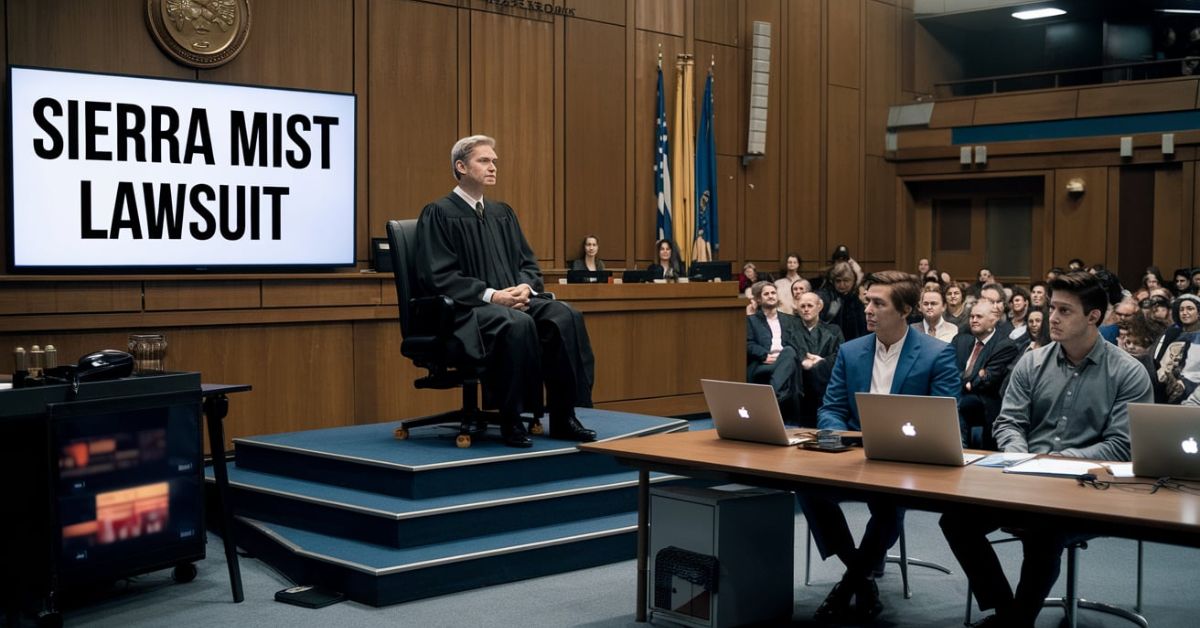Sierra Mist Lawsuit: A Comprehensive Overview of the Legal Battle Involving PepsiCo and Trademark Infringement
The Sierra Mist lawsuit has caught significant attention in 2023 due to the claim made by a YouTube content creator against PepsiCo, the multinational corporation behind the popular soft drink, Sierra Mist. The issue centers around a trademark infringement allegation that PepsiCo made, which led to a legal dispute. This article will dive into the details of the Sierra Mist lawsuit, examine the claims, explore the legal ramifications, and provide unique interpretations that go beyond the surface.
By the end of this article, you will have a thorough understanding of the Sierra Mist lawsuit, its background, PepsiCo’s role, and the potential impacts of the case on intellectual property rights. We will also address frequently asked questions related to this case and how it affects consumers and businesses alike.
In July 2023, a content creator on YouTube claimed that PepsiCo, the owner of Sierra Mist, accused her of trademark infringement. According to her statement, PepsiCo sent her a legal notice, alleging that her use of a certain brand name or content infringed on their Sierra Mist trademark. The video, which gained substantial attention online, sparked a conversation about the boundaries of intellectual property, specifically in the context of trademark laws.
While this is not the first time a major corporation like PepsiCo has been involved in a trademark dispute, the Sierra Mist lawsuit highlights the growing tensions between large companies and small creators or businesses. This case also serves as a stark reminder of the legal complexities surrounding trademarks in the digital age.
What Is Sierra Mist?
Sierra Mist is a lemon-lime-flavored soft drink introduced by PepsiCo in 1999. The brand has undergone several changes over the years, including reformulations and rebranding efforts. In 2023, PepsiCo decided to retire Sierra Mist and replace it with Starry, another lemon-lime soda aimed at appealing to younger consumers.
Despite its discontinuation, Sierra Mist remains a well-known name, making PepsiCo’s desire to protect its trademark understandable. The lawsuit, however, raises questions about how companies enforce their trademarks, particularly when dealing with smaller entities or individuals.
The YouTuber’s Claim
The YouTuber at the center of the Sierra Mist lawsuit uploaded a video in July 2023, explaining that she received a legal notice from PepsiCo accusing her of trademark infringement. According to her, PepsiCo claimed that her use of a certain name or content was too similar to the Sierra Mist brand, thus violating their trademark rights.
In the video, the content creator expressed surprise at being targeted by a corporation as large as PepsiCo, stating that she believed her content or brand had no significant overlap with the famous soft drink. She shared her frustrations with the process, noting that legal fees and the potential consequences of the lawsuit could be devastating for a small creator like herself.
PepsiCo’s Trademark Enforcement
PepsiCo’s aggressive defense of its Sierra Mist trademark is not unusual for large corporations. Trademarks are valuable assets, and companies often go to great lengths to protect them from misuse or infringement. However, the Sierra Mist lawsuit raises questions about whether PepsiCo’s actions were necessary or excessive.
Trademark infringement occurs when a person or business uses a brand name, logo, or other trademarked material that is too similar to an existing trademark, causing confusion among consumers. In this case, PepsiCo likely argued that the content creator’s use of a similar name or branding could mislead consumers into thinking it was associated with Sierra Mist, thereby damaging their brand.
The Legal Basis of the Sierra Mist Lawsuit
To understand the Sierra Mist lawsuit better, it’s essential to explore the legal basis for such claims. In the United States, trademark law is governed by the Lanham Act, which provides protection for brand names, logos, and other symbols associated with a product or service.
Under the Lanham Act, companies like PepsiCo can file lawsuits against anyone they believe is infringing on their trademark. To win a trademark infringement case, the plaintiff (in this case, PepsiCo) must prove that:
- They own a valid trademark.
- The defendant’s use of the trademark is likely to cause confusion among consumers.
- The use of the trademark has caused or could cause harm to their business.
In the context of the Sierra Mist lawsuit, PepsiCo would need to demonstrate that the content creator’s use of a similar name or branding would confuse consumers and harm their business interests. The fact that Sierra Mist is a well-known brand could strengthen PepsiCo’s argument, as courts are often more protective of famous trademarks.
The Role of Intellectual Property in the Digital Age
The Sierra Mist lawsuit highlights the growing importance of intellectual property in the digital age. With the rise of social media platforms like YouTube, more individuals and small businesses are creating brands, products, and content that can inadvertently run afoul of existing trademarks.
In this case, the YouTuber likely had no intention of infringing on PepsiCo’s Sierra Mist trademark, but her use of a similar name or branding still triggered legal action. This underscores the challenges that content creators face when navigating the complex world of trademark law.
It’s also worth noting that large corporations like PepsiCo have teams of lawyers dedicated to monitoring and protecting their trademarks. As a result, even small creators can find themselves entangled in legal battles with major companies over trademark disputes.
Why the Sierra Mist Lawsuit Matters
The Sierra Mist lawsuit has broader implications beyond this specific case. It serves as a cautionary tale for content creators and small businesses who may unknowingly infringe on a trademark. The case also highlights the power imbalance between large corporations and individuals, as well as the need for a better understanding of intellectual property laws.
Additionally, this lawsuit brings attention to the question of whether companies should take a more measured approach when enforcing their trademarks. While it’s important for businesses to protect their intellectual property, overzealous enforcement can lead to negative publicity and potential backlash from consumers.
Potential Outcomes of the Sierra Mist Lawsuit
As of now, the Sierra Mist lawsuit is still unfolding, and it’s unclear how the case will be resolved. However, there are several possible outcomes, depending on how the legal proceedings unfold.
- Settlement: One common outcome in trademark disputes is a settlement between the parties. In this case, the content creator and PepsiCo could reach an agreement that allows the creator to continue using her brand in exchange for certain conditions, such as modifying the branding or paying a licensing fee.
- Court Ruling: If the case goes to court, the judge will decide whether the content creator’s use of the trademark constitutes infringement. If PepsiCo wins, the content creator may be forced to stop using the brand and pay damages. If the content creator wins, PepsiCo’s claim will be dismissed.
- Public Backlash: Another potential outcome is public backlash against PepsiCo. In recent years, consumers have become more vocal in their opposition to large corporations using their power to target smaller entities. If the lawsuit gains more attention, it’s possible that PepsiCo could face criticism from consumers who view the lawsuit as unnecessary or unfair.
Key Takeaways from the Sierra Mist Lawsuit
The Sierra Mist lawsuit serves as a reminder of the importance of understanding intellectual property laws, especially for content creators and small businesses. Here are some key takeaways from this case:
- Trademark protection is critical for businesses, but it’s essential to strike a balance between defending intellectual property and avoiding overreach.
- Small creators must be aware of potential trademark conflicts and take steps to avoid infringing on established brands.
- Large corporations should consider the public relations impact of pursuing legal action against individuals or small businesses, particularly when the alleged infringement seems minor.
- Trademark law is complex, and even unintentional infringements can result in legal consequences. Consulting with a legal expert before launching a brand or business is crucial.
FAQs About the Sierra Mist Lawsuit
1. What is the Sierra Mist lawsuit about?
The Sierra Mist lawsuit involves a trademark infringement claim made by PepsiCo against a YouTube content creator. PepsiCo alleges that the creator’s use of a name or branding too closely resembled their Sierra Mist trademark, leading to a legal dispute.
2. Why did PepsiCo file a lawsuit?
PepsiCo filed the lawsuit to protect its Sierra Mist trademark. The company argued that the content creator’s use of similar branding could confuse consumers and harm their business interests.
3. What are the potential outcomes of the lawsuit?
The lawsuit could end in several ways, including a settlement, a court ruling in favor of either party, or public backlash against PepsiCo. The content creator could also be forced to change her branding or stop using it altogether.
4. How does trademark infringement work?
Trademark infringement occurs when someone uses a brand name, logo, or other trademarked material that is too similar to an existing trademark. This can cause confusion among consumers and potentially harm the trademark owner’s business.
5. What can content creators do to avoid trademark infringement?
Content creators should conduct thorough research to ensure that their brand names and logos do not infringe on existing trademarks. It’s also helpful to consult with a legal expert to navigate intellectual property laws.
6. What is Sierra Mist?
Sierra Mist is a lemon-lime-flavored soft drink created by PepsiCo in 1999. It was recently discontinued and replaced by a new drink called Starry.
7. How does trademark law affect small businesses?
Trademark law affects small businesses by requiring them to avoid using brand names, logos, or symbols that are too similar to existing trademarks. Failure to do so can result in legal disputes and potential financial penalties.






